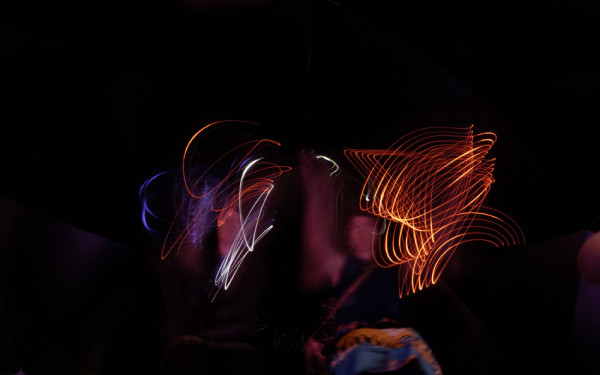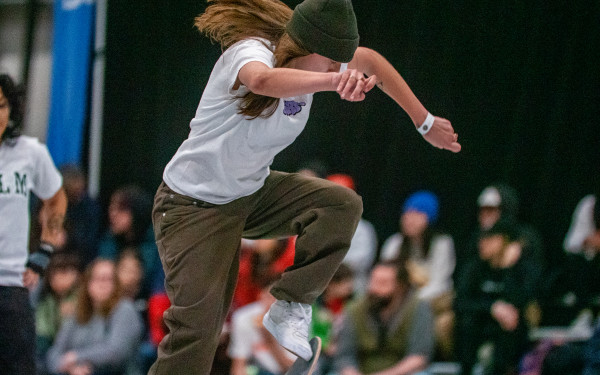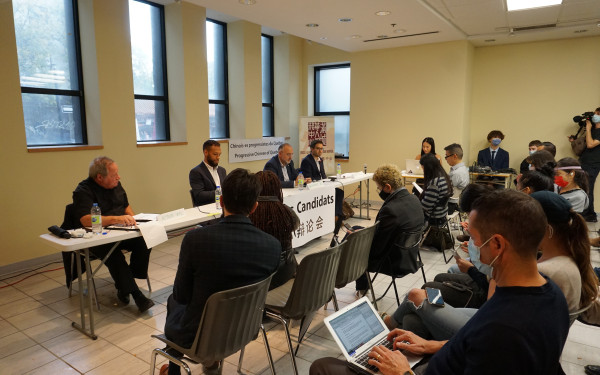The Pope of Peace Park
The Story of “Boots,” the Man Who Fought to Legalize Skateboarding in Montreal
“Boots” sits as if he has just realized the full weight of his decade-long labour of love. He won’t even crack a smile. I cannot fathom how such a curmudgeonly man could be so admired.
“Sorry dude,” David “Boots” Bouthillier says, his bloodshot eyes shifting away from my inquiry. “A good friend of mine passed away today, and I’m just not in the mood.”
My fingers reel every time we greet. His granite hands could have been hardened on a construction site. In truth, they are from a long grind on the stones of Peace Park. Despite the puffed-out concrete chest, a heart the size of the Rock of Gibraltar is able to pump a whole lot of love beneath the rigid exterior.
For ten rough years, he worked with the Société des Arts Technologiques (SAT) to convince city hall that legalizing skateboarding could rejuvenate Peace Park. Their efforts proved fruitful. Last year, the city launched a pilot project that allowed skateboarding in the square for a short period between July 9 and Sept. 26.
“Businesses were happy,” says Boots. “It helped improve the park’s image.”
So, at the last meeting of the Ville-Marie borough council before Christmas, Bouthillier swaggered into the room like Patrick Swayze. He even presented Montreal mayor Denis Coderre with a custom-made skateboards bearing his signature.
Then, the 35-year-old lit up like a child’s eyes on Christmas Day. Coderre had agreed to start the process of permanently legalizing skateboarding in Peace Park.
“I would like to thank you,” said Coderre to a humbled Boots. “This is part of the solution. And it’s one of the most splendid projects I’ve seen in a long time.”
On The Main, the local skateboarder’s status was near legendary even before this achievement.
I got to know the guy as part of a photojournalism project. I followed him one night as jolly bouncers welcomed him in like a VIP, and bar owners traded jokes and shots like it was Mardi Gras. By the end of the night, I wasn’t even able to walk straight. Boots, however, remained sober.
“I’m on a diet,” he says, “I haven’t had a drink for three days straight.”
Bouthillier has been a mainstay in the neighbourhood for more than a decade. Everybody who is anybody seems to know him. Pizzerias feed him for free. His boards adorn the walls of several bars and shops including TRH Bar, Bar Bifteck St-Laurent and Montreal Pool Room.
His graffitis decorate dark alleyways and dingy watering holes alike from Mont-Royal to Ste-Catherine St.
He is an unabashed Instagram celebrity, worshipped by the likes of MTL Blog. They dubbed his account the best in the city and—curious fact—he didn’t even have to pay for the publicity. Best of all, his close friends have great stories to tell about him.
“I once saw a UFO with Dave,” said partner in crime Patrick O’Connor, a documentary filmmaker who focuses on the street art scene. “We were sitting on a roof and we saw flashing lights defying the laws of physics.”
Like O’Connor, Boots has helmed a documentary. Called Peace Park, the film is an ode to street life and, of course, the history of the park itself.
The area, on St. Laurent Blvd. just north of René-Lévesque Blvd., has long been an infamous chill spot for drug pushers and cobblestone-gazing addicts, vagrants and nightstick-toting flatfoots alike. Its peculiar architecture has made it a popular—albeit for a long time illegal—skatepark in Montreal. Its borders are framed by rows of connected stones that facilitate grinding, a trick that involves sliding along an object using the trucks of a skateboard.
“That’s why the stones are all worn,” says Boots.
In a city where police officers hand out mammoth fines just for skating on the edge of a sidewalk, Bouthillier is something of a collector.
“You could get served a ticket of more than $600 for skating at Peace Park,” he says. “Trust me, I know.”
When the SAT opened its doors in 2004, they weren’t blind to the cycle of poverty, violence and addiction that overwhelms the area to this day. Marie Létourneau, the SAT’s director of public and media relations, says they were also aware of the benefits that skateboarders have on whichever environment they choose to inhabit on any given day.
“Skateboarders tend to scare away the violent types who merge at the park,” says Létourneau. “They pick fights around the stones. They can’t do that when the skaters do that trick when they slide.”
She says it was fitting to choose Boots to help rejuvenate the area. But in 2004, Bouthillier says the city was desperate to sell the land surrounding the park to condominium developers. They had no time for hipsters and extreme sports enthusiasts peddling a pet project.
“They ordered the police to clean up the place,” says Boots. “And that included us.”
When I ask him about his future plans, Bouthillier succeeds at hiding his determination like a long-distance runner would his perspiration. Despite his triumph, this is a man constantly afraid that the rug will be pulled out from under him. Past failures have taught him better. He never sheds his humility even when talking of past actors who, he claims, never gave him a fair shake.
“We didn’t have support from influencers back then. It just wasn’t the right time,” he says. “This mayor is open to new projects though. We’ll see what happens. For now, we have several events lined up for next summer.”
The system is a slow-moving beast. Boots and the SAT are still waiting on city hall as they determine how to implement the new rules.
Correction: In our profile of David Bouthillier, we retracted a sentence that seemed to suggest that he might have addiction problems.
Clarification: When mentioning violent types at the park, Marie Létourneau only meant a small portion of the park’s clientele.

4_900_600_90.jpg)
7_900_675_90.jpg)
8_900_669_90.jpg)
6_900_600_90.jpg)
2_900_600_90.jpg)
1_900_600_90.jpg)
3_900_600_90.jpg)

3_600_375_90_s_c1.jpg)


